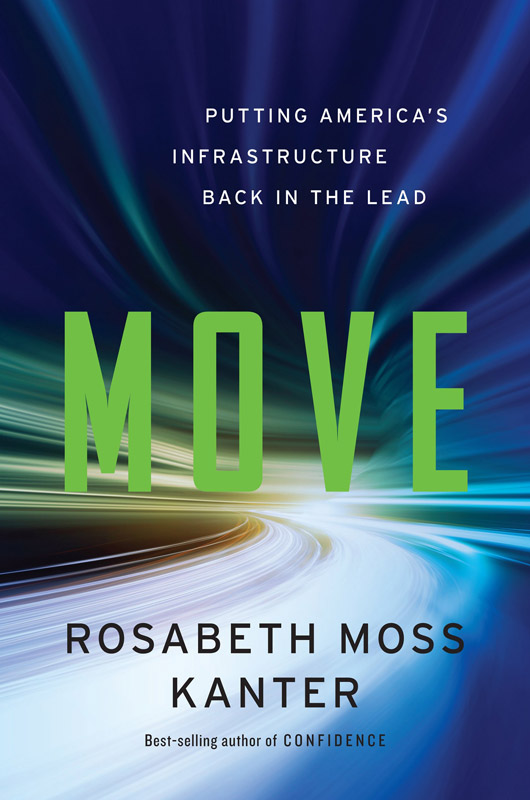Tired of potholes, flight delays and other obstacles to mobility in the United States, Rosabeth Moss Kanter decided last year to take matters into her own hands. The Harvard Business School professor and seasonal Edgartown resident wrote the manuscript for her new book, Move: Putting America’s Infrastructure Back in the Lead, in a single summer on the Vineyard.
The book, released in May by W. W. Norton & Company, is a national call to action in the areas of repair, renewal and reinvention. Ms. Kanter has shed light on the challenges and complexity, but also the unprecedented opportunities in the world of infrastructure. In a recent conversation with the Gazette, she related some of the book’s many topics to the Vineyard.
Among other things, the book explores the emergence of transportation network companies like Uber that are changing the way many people get around. On the Vineyard, the recent arrival of Uber has raised questions about the future of local taxi companies, which would need to compete for fares.
In a digitally connected world, Ms. Kanter writes, communication networks themselves have become a type of infrastructure. But network-based companies like Uber tend to bypass established systems, causing a political stir when they appear. Uber’s product is technology, not cars, giving it an advantage over traditional taxi companies, which still must follow local regulations.
“Uber is fascinating because it has managed to alienate nearly every major group and yet still be valued at $50 billion,” Ms. Kanter said. The San Francisco-based company allows people to use their mobile devices to locate and summon private drivers who are connected to the network. Despite the concerns (a cease and desist order in San Francisco was in place until 2013) Uber continues to grow because people are hungry for easy ways to get around using just their phones and credit cards, Ms. Kanter said.
The idea for Move was sparked by conversations with Rodney Slater, Secretary of Transportation under President Bill Clinton, whose administration had issued a 25-year vision for U.S. transportation, prior to the attacks of 9/11 and the crash of the dot-com bubble. Some time later, with the plan languishing, Mr. Slater took part in a leadership initiative that Ms. Kanter leads at Harvard, and impressed upon her the continuing need for a 21st century vision for U.S. transportation.
Ms. Kanter began noticing the outdated and inadequate infrastructure all around her in Boston and elsewhere. At the same time, she was struck by the superior roads and public transportation systems in other countries, including Japan and Germany. In Tokyo, she marveled at the seamless transition from air to rail.
A national summit she convened at Harvard Business School, with leaders from many different sectors, concluded in part that the national infrastructure discussion was limited to economists, techies and Washington insiders, without much input from the public. “Average citizens, ordinary people, felt the problems but didn’t really see all the connections,” Ms. Kanter said. The summit led to a brief report, but that wasn’t enough. “This required a book,” she said.

After a marathon year of research, interviews and travel, Ms. Kanter settled into her longtime home on the Edgartown Great Pond last spring, writing almost steadily through the summer, finishing a draft manuscript in August. She will speak at the Martha’s Vineyard Book Festival, which takes place August 1 and 2.
The Vineyard faces many of the same problems as large cities, she said, but on a much smaller scale: namely, too many cars trying to get to the same places at the same times. And emerging infrastructure models that are changing travel within and between cities are affecting smaller communities as well.
“Technology can make a huge difference, even in small places,” Ms. Kanter said. “Uber is already taking cars off the streets.” In the future, she said, technology could also improve parking on the Vineyard by allowing cars to park themselves, or to summon themselves from the ferry. “We haven’t figured all the ways to use this, but it’s coming,” she said.
Move also looks in depth at the potential for high-speed rail in the U.S., along with ways to improve U.S. airports and make cities more travel-friendly and conducive to bikers and pedestrians. A chapter on financing and politics helps set a course for real change.
In most cases, major infrastructure projects would require government subsidies, but that would be expected, since hardly any public transportation services can survive on passenger fees alone. “We should start just imagining what we can do with these services,” Ms. Kanter said.
Because the Vineyard has no centralized transportation department, she stressed the importance of town leaders who are willing to collaborate. Nonprofits such as the Martha’s Vineyard Hospital, with an interest in safe, efficient roads, often become major players in shaping infrastructure. At a time of national inaction, Ms. Kanter writes, solutions depend even more on regional leadership and collaboration.
Last summer, Ms. Kanter pulled herself away from the computer for long enough to attend a few summer events, including the annual forum hosted by the Hutchins Center for African and African American Research at Harvard, held each year at the Old Whaling Church in Edgartown. The forum explored Barack Obama’s presidency in the context of race, with some heated discussion, and helped drive Ms. Kanter to finish the book.
“I really began to see this as an equity issue,” she said. “If we care about social justice in America, then we care about good, public transportation that gets people to jobs” and better schools. She noted that low-income families, which are disproportionately African-American and Hispanic, are less likely to own cars.
Despite the many opportunities for change, America is stuck in the past, Ms. Kanter said, in large part because the various players — in industry, government and the nonprofit sector — don’t communicate. Town meetings and civic volunteer groups on the Vineyard embody “democracy at its best,” she said. “But we now live in a complex world,” with a greater need for collaboration.
She calls for both national and regional discussions surrounding infrastructure, including on the Vineyard, to start looking seriously toward the future. (The Martha’s Vineyard Commission has already embarked on a 25-year transportation plan.)
Entrepreneurs with big ideas like Uber need to be part of the discussions, Ms. Kanter said. “The politics of this are [that] entrepreneurs sometimes don’t want to play by the rules, and the established government leaders and the established industries really don’t want change,” she said. “But how do we get them to have a conversation? Because change is going to happen, and it ought to be change that we like.”
Move: Putting America’s Infrastructure Back in the Lead is on sale at Bunch of Grapes Bookstore in Vineyard Haven.







Comments (2)
Comments
Comment policy »